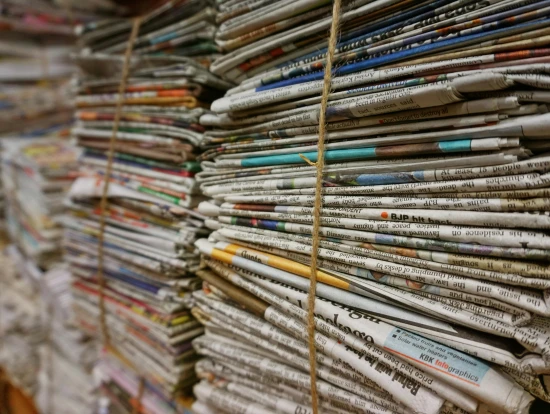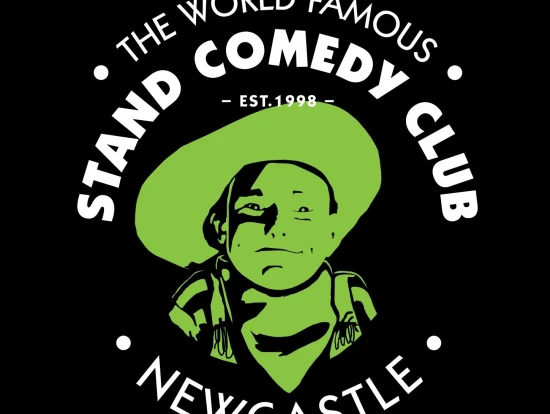Meet the Cast of War Horse at Newcastle Theatre Royal
We speak to cast members from War Horse at Newcastle Theatre Royal
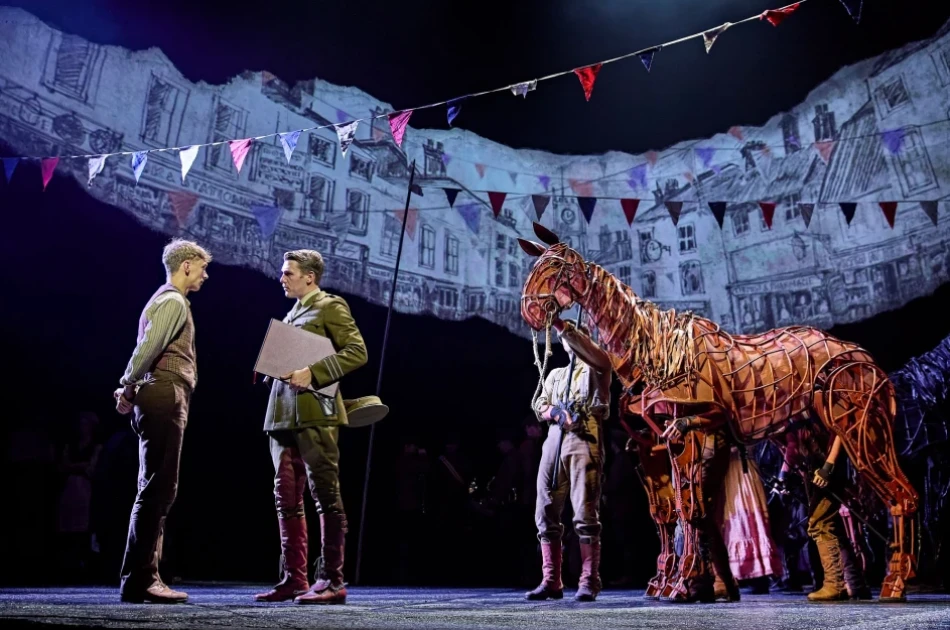
As War Horse gallops onto the Theatre Royal stage this September, we jumped at the opportunity to speak with two members from this unmissable production.
After being treated to seeing Joey and Albert in action, we sat down with Owen Dagnall (alternate Albert & Geordie) and Tom Gilbey (Sergeant Fine/Movement & Puppetry Captain) to talk all things touring, puppetry, and War Horse.
What do you think people will be talking about on the way home after War Horse?
Owen: That’s a really good question to start off with. Because there’s so much stuff happening, there’s a lot of tears, and a lot of emotion, but also they’ve done it so well that there’s also a lot of laughter.
It really depends on what you pick out, every night is different, so one night you’ll see the horse and it moves slightly differently, you go “did you see that there?” to Sergeant Thunder doing something really funny and extraordinary.
So it’s something that you have to come a second time because there’s so many different things that change, and yeah it’s beautiful.
Tom: Goodness… It’s always the puppets. It’s quite often the goose, people love the goose! But yeah, I mean generally it’s the way that the show still asks the audience to come halfway. And by that end, I mean it engages the imagination in a way that I don’t see regularly now in theatre, not to say that other productions are wrong, it’s just different styles.
I think we are a more classical style, where we are light on the set front, we like to present quite minimalist in terms of tech, and it really is about imagination. And so we give you quite literally the bare bones of something, and the audience flesh it out. And that means they connect with the show in a way that just feels incredibly powerful and memorable in a way that maybe it’s hard to sustain when everything is given more on a plate.
I think we ask something of the audience, and I think they value that because it brings out that old playful nature that we used to have in abundance as kids, but maybe as adults, we’ve neglected slightly, and so we bring out a playfulness in audience members. I think they love that being awakened within them, because they’ve experienced something that’s as much in their mind as it is in their eyes. And it’s a really beautiful thing to be part of that.
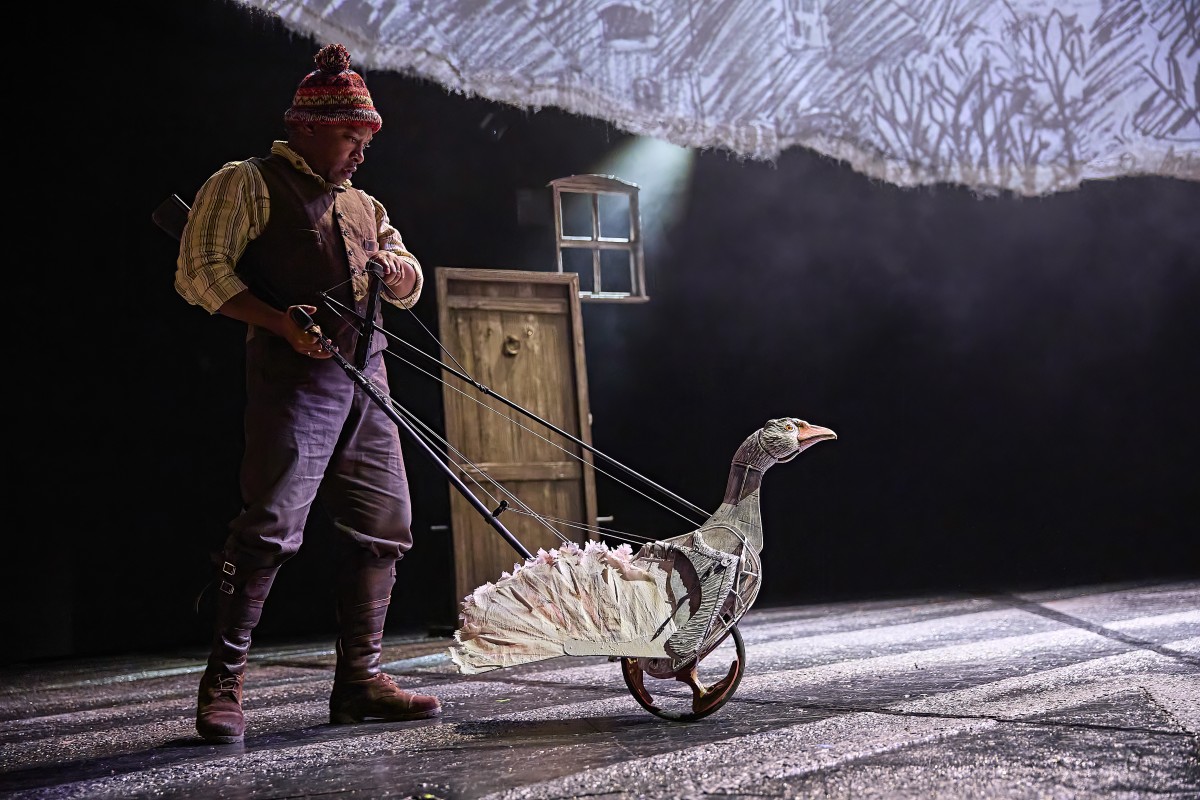
If someone’s never seen War Horse before, what can they expect?
Owen: A lot of warmth, love. Hopefully you’ve got some tissues on you, because you’ll be crying and laughing as well!
As much as it’s kind of bizarrely weird, they’ve done it so well. Like I said prior, where they’ve plotted the whole entire show where there’s a lot of sorrow and a lot of warmth and joy, and then just when you think that you’ve cried all your tears out, you’re crying again but with laughter and happiness!
So much emotion is all packed into the space of two hours, which is brilliant.
Tom: The audience can expect something very, very unique. I think there’s very few shows like this out there. I think they’ll have to come with an open mind, and if you can come with that open mind, I think you’ll have an experience which will last a lifetime in your memory.
The puppets are extraordinary, still to this day, they are as extraordinary as they were in those early days at the National Theatre in 2007 where it was like nothing else, and I think even today it’s like nothing else. We’ve worked really, really hard to make sure its retained the brilliance that was instilled in the show all those years ago.
And the work that the actors put in, that the puppeteers put in… you know every actor is a fourth puppeteer. When you’re on stage, everyone has a responsibility to be part of the puppeteering, even if they’re not in the horse, they are a part of making that world that makes that horse seem real. So even when you’re acting opposite, if you don’t move out the way of the horse, as you would in real life, it just makes us think that maybe the horse isn’t real, so there’s a responsibility there, and I think the audience feel that. And because they see that, they act accordingly, that they are at the theatre, actually seeing a troup of horses galloping around. So it’s something that sticks with you, I remember seeing it for the first time, and it stuck with me.
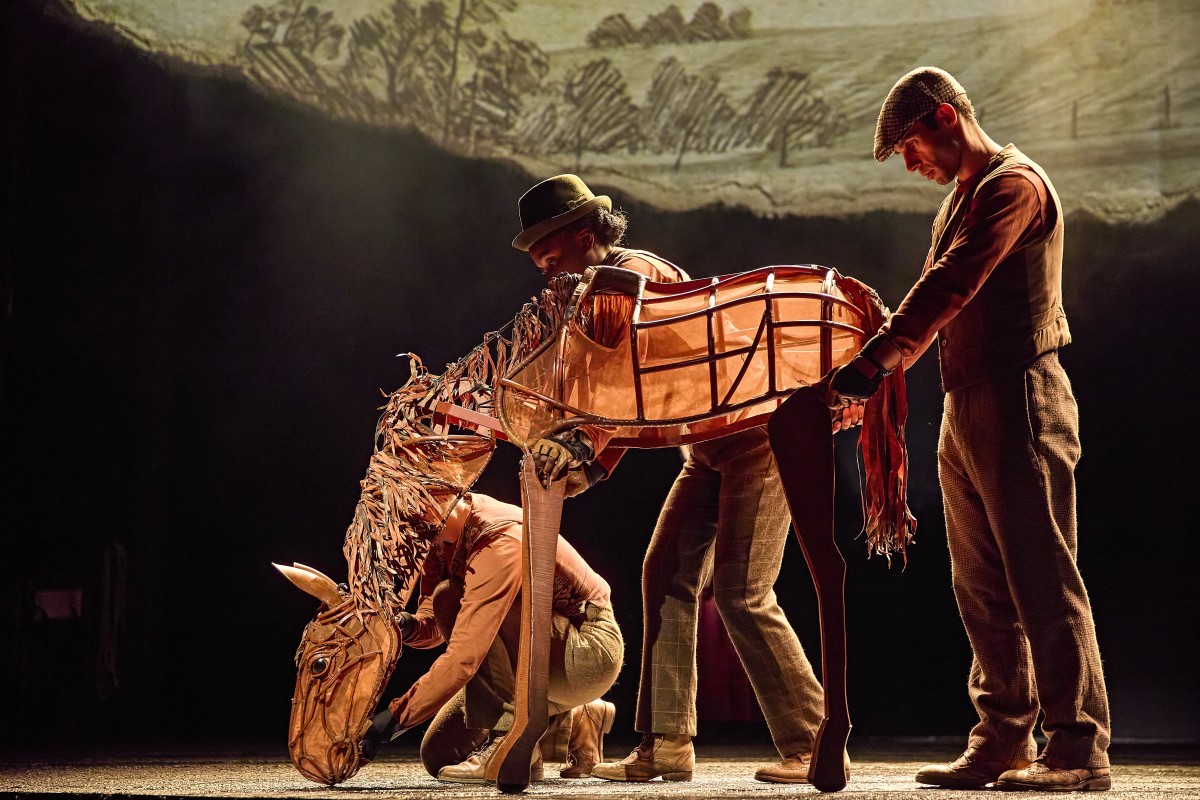
How would you describe the show in three words?
Owen: I’d say… joyful, playful and hopeful.
Tom: Unique, huge and surprising.
Why do you think it’s important for shows like War Horse to come on major UK tours like the one you’re currently on?
Owen: This is actually a question that I’m quite passionate about. So I’m from the region, and especially in the North East, there’s not much theatre at all, and they don’t get the joys to come down and see any shows in London.
So these pockets of lively communities just don’t have what they do in London. It’s something that especially the Nationals is they’re going right, okay, let’s go to these regions and go, look, we’re not neglecting you at all, we all have a voice and we all want to hear it. It’s also very rare to hear a Geordie's voice in national theatre, let alone, even on TV or in a play or whatever.
To be able to do that, yeah it’s very special, and wanting more people from these region to pick up acting or any form of creativity, I think is very important.
It’s… it’s a hard one because I think it’s very easy to kind of neglect us lot up here, very easy, I think that’s even more of a push to go “do you know what? No, we are here, and we’ve got stories, we’ve got voices, we’ve got so many talented people.” And so to see something like this, to see someone from the region do something like this, anyone who’s watching whether you’re five, twenty-five, forty, sixty, goes “oh actually I quite like the look of that, I kind of want to do it”. Because I tell you what, it’s fun and anyone can do it.
War Horse obviously debuted way back in 2007, why do you think it’s just become such a beloved show and continues to grow?
Owen: I think it’s something to do with the universal feeling of love towards an animal, regardless of who you are, where you’re from, everyone’s got a connection to an animal, whether that’s a dog, a cat – there’ll be loads of horse lovers so it’s like ah amazing, even better! But it’s something that we can all relate to, no matter where you’ve been brought up or what you sound like, and we all love a good hope story, do you know what I mean? It's always good to have a little bit of a good cry as well. Even when it’s happy in the end, it’s very therapeutic!
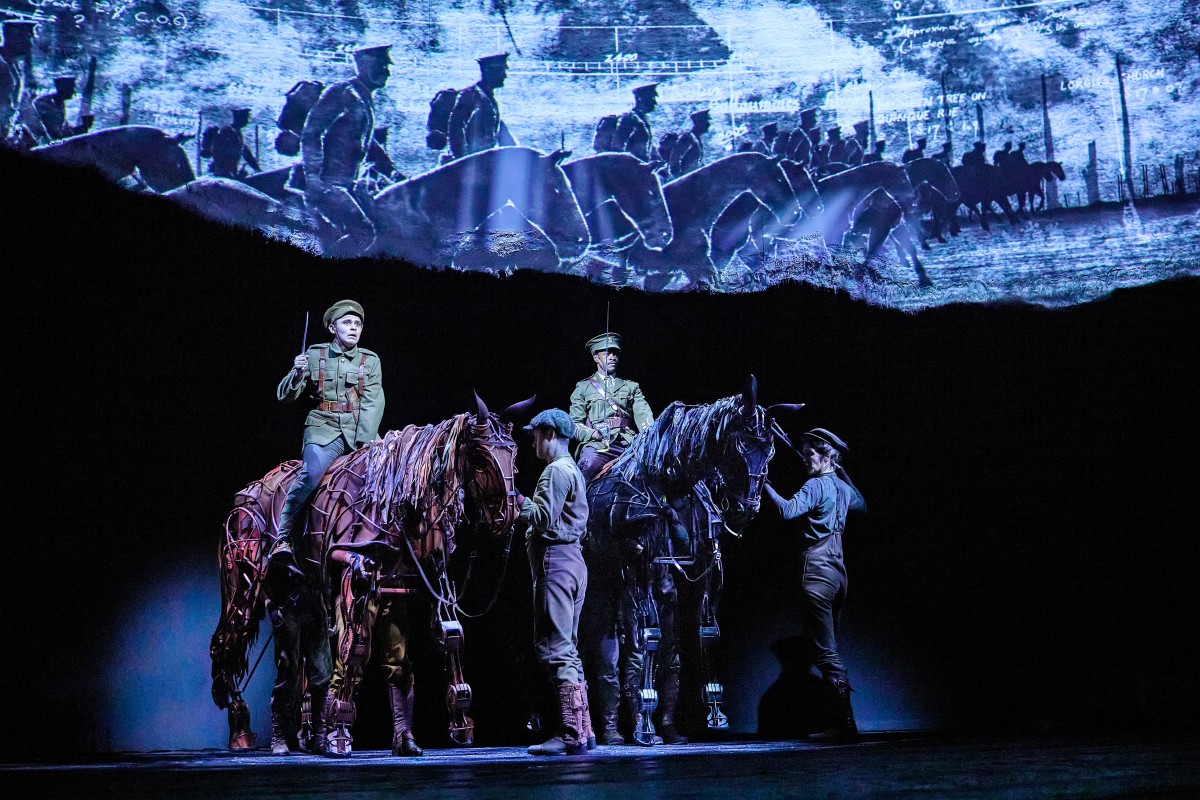
What has been the biggest challenge of bringing Joey to life on the stage?
Owen: I think studying how a horse reacts is important first, because not only do you have the three puppeteers, but then you’ve got you as the fourth. So no matter how good the horses are, how good Joey is, if you can’t understand how a horse reacts, then we’re not going to believe it as an audience, and then certainly I don’t really kind of believe it because I’m not really doing it properly.
So, just learning about keeping the space when you first meet him, it’s about like the sense of your hand and his nose are so important, which I think is really tricky to do, but as soon as you study it and you see it in real life, then jobs a good’un really.
Tom: I think it’s those early days where you meet two new people that are going to be your team for potentially the next year, two years, and you need to very quickly create a language between you, which needs to be non-verbal. We can’t talk when we’re in horse, we have mics on, we do the noises! So all the blows and the neighing and the whinnies, we do. So we can’t, you know, go over our shoulder and say “can you move left?” We need to somehow communicate beyond that regular type of communication, and so you find a way to breathe together and just, you know, you learn a lot about each other and each other’s instincts. And before you know it, you can almost second guess it.
And so you create this amazing bond with these two other people in your horse team. And you learn a lot about how to communicate with others, and I think it ends up making me certainly a better actor. So yeah, that was tricky, just being patient and trusting time.
But the rehearsal process was amazing, and those people that I started that job with are still my very, very dear friends now, we still have it, I think a connection that people can kind of tangibly see.
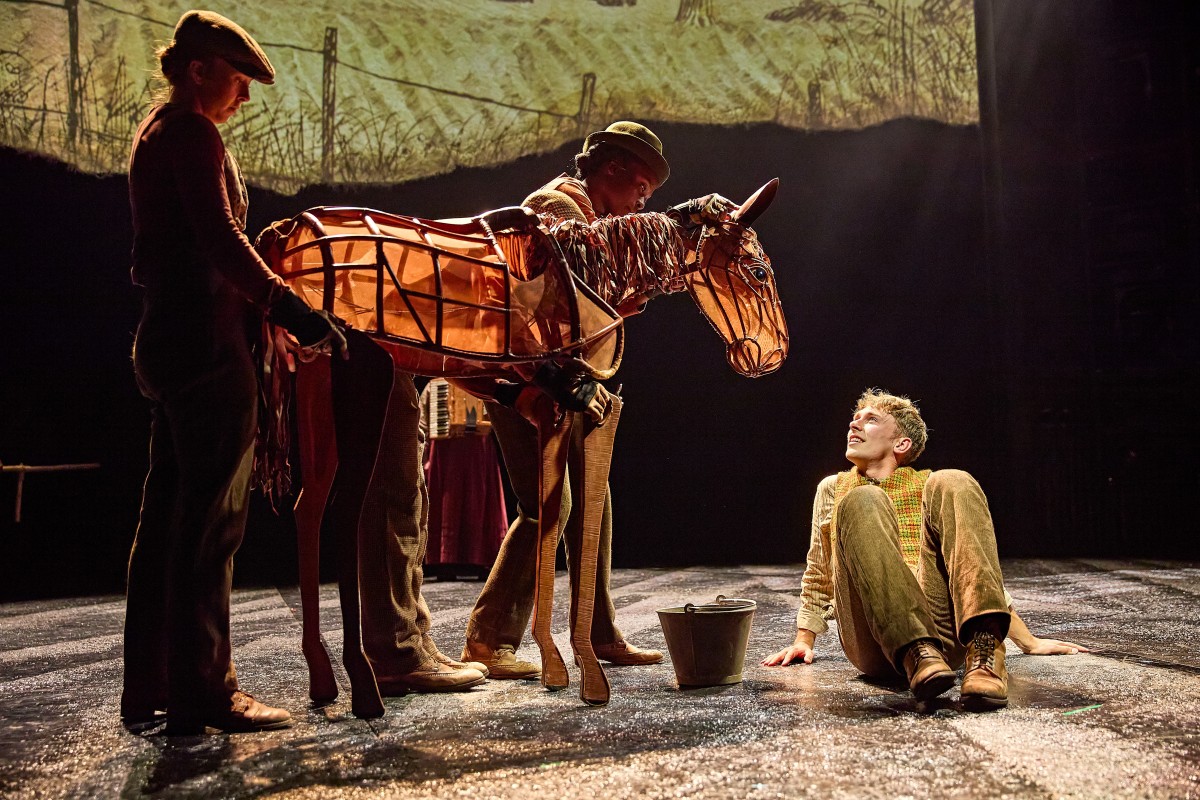
If someone was sat on the fence humming and harring over getting a ticket, what would you say to persuade them?
Owen: Do it! There’s not a show like it. It’s been running for so many years, and it’s changed so many times, and no matter how many times it will keep on going on, there’s people from the past who have played it, have done it, that you can feel on stage. And it’s a community thing, we can all relate to a community because we have it in our lives, and we try to bring that on stage, and you feel it. And if you just want a pick up in life, or whatever happening’s in that form, come watch it and hopefully we can fill you full of that joy.
Between the book, film, or theatre performance for War Horse, which one would you personally pick?
Owen: The book’s great, I read the book when I was in school. The book is the original Michael Morpurgo’s written it beautifully, and done so well in his hard work and dedication to tell that story, from when he first was sat down at the pub from the original person who told the story about the horses going to war, and then his knowledge and translating it and ringing up to find out how many war horses went to war. They didn’t have an estimation, they said roughly it was about a million, and then he was like “do you know how many came back? And I think, I don’t want to assume a number, but I think it was less than 50,000, so you can imagine that there were a lot of ones that died.
War Horse is playing at Newcastle Theatre Royal up until 20th September. To find out more, including how to book tickets, visit the Theatre Royal website.
Main image: Brinkhoff Moegenburg
Want to be in the know about everything that’s happening in Newcastle city centre? Sign up to our newsletter and follow us on Facebook, Instagram, X and TikTok.

